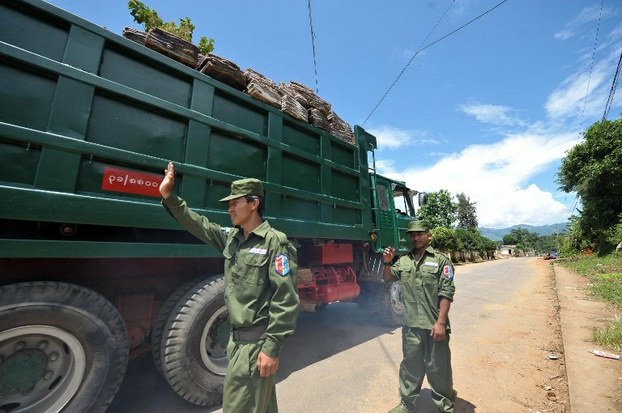Myanmar government peace envoy to meet with Shan groups
| Publisher | Radio Free Asia |
| Publication Date | 6 June 2016 |
| Cite as | Radio Free Asia, Myanmar government peace envoy to meet with Shan groups, 6 June 2016, available at: https://www.refworld.org/docid/5760fc2a15.html [accessed 21 May 2023] |
| Disclaimer | This is not a UNHCR publication. UNHCR is not responsible for, nor does it necessarily endorse, its content. Any views expressed are solely those of the author or publisher and do not necessarily reflect those of UNHCR, the United Nations or its Member States. |
2016-06-06
 United Wa State Army soldiers stop a truck at a checkpoint in the Wa region of Shan state in a file photo. AFP
United Wa State Army soldiers stop a truck at a checkpoint in the Wa region of Shan state in a file photo. AFP
Two armed ethnic groups from Myanmar's Shan state that did not sign a nationwide peace agreement with the Myanmar government last year agreed on Monday to meet a government committee working on an upcoming peace conference, an official involved in the process said.
The United Wa State Party (UWSP) and its political wing the United Wa State Army (UWSA), and the Myanmar National Democratic Alliance Army (MNDAA) have agreed to talk with the convening committee of the 21st-century Panglong Conference, said committee secretary Hla Maung Shwe.
Under the previous government, the two rebel groups, who are not members of the United Nationalities Federal Council (UNFC) – an alliance of armed ethnic groups that did not sign the nationwide cease-fire agreement (NCA) last October – had called for separate autonomous states. The MNDAA, which had been fighting the Myanmar army in Shan state's Kokang self-administered zone, was excluded from the NCA talks.
Tin Myo Win, the new peace envoy of the National League for Democracy (NLD) government, met with leaders from the UWSA and MNDAA to get them to agree to a sit-down meeting in the run-up to the peace conference scheduled for late July.
"Our Chairman Tin Myo Win himself contacted them on the phone and made an agreement to sit down with them for a meeting," Hla Maung Shwe told RFA's Myanmar Service. "It's likely we will have it in a few days; we just need to find a suitable venue."
Tin Myo Win, who was appointed to his position by State Counselor Aung San Suu Kyi, also plans to contact the Ta'ang National Liberation Army (TNLA), which was also excluded from the NCA.
But Hla Maung Shwe said representatives from the government's peace team had yet to meet TNLA leaders to clarify the government's position.
Committee members attempted last weekend to meet the armed ethnic groups that had not signed the NCA in Chiang Mai, Thailand, but the TNLA did not respond to a request for a sit-down.
Nevertheless, the TNLA has been invited to the commercial capital Yangon for further talks this month.
Last week, Tin Myo Win met in Thailand with representatives from the UNFC to invite them to the Panglong Conference.
Aung San Suu Kyi, Myanmar's de facto leader, has opened the door for all rebel groups to participate in what she has termed a 21st-century Panglong Conference, modeled on a similar meeting that her father, late General Aung San, held with ethnic groups in 1947.
Unity among Shan groups
Also on Monday, Khun Tun Oo, chairman of the Shan Nationalities League for Democracy (SNLD), called for unity among all ethnic groups at the Panglong Conference.
"This conference can only be a success if all individuals, groups and parties representing the Shan people, who deserve to be among the participants, are invited to take part in it with the spirit of preserving the Union and all work together," he said during a speech marking the 20th anniversary of the founding of the Shan State Joint Action Committee (SSJAC) in Lashio.
Members of the SNLD attended the anniversary celebration along with leaders from the Shan State Progress Party/Shan State Army (SSPP/SSA), Hsinkyaut militia leaders, and 400 members from various local groups.
The SSJAC was formed jointly in 1996 by the SNLD and the two Shan armed groups in a bid to resolve the war-torn region's problems through political means.
The meeting participants also discussed the latest round of fighting between the Ta'ang and Shan groups in northern Shan state.
Support from former activists
Students and worker activists who participated in various demonstrations in the mid-1970s pledged on Monday to support the government's efforts to hold the new Panglong Conference.
The activists held a gathering in South Okkalapa township in Yangon to commemorate riots that took place during that time.
"We have new hope after seeing a new political scenario and the encouraging efforts of the new government, including the plan for a 21st-century Panglong Conference," said Kyaw Aung, a former student leader of the 1975 demonstrations.
"And so, to continue carrying out our historic tasks, we have decided to join hands with all political forces, ethnic forces and new student generations to support Aung San Suu Kyi's new government."
Authorities under former military commander and president Ne Win violently attacked laborers who demonstrated in mid-1974 for adequate rice supplies and workplace guarantees, shooting dead about 100 of them. Authorities also violently attacked student demonstrators in December 1974 and June 1976.
Reported by Tin Aung Khine, Kan Tha, Thiha Tun and Htet Arkar for RFA's Myanmar Service. Translated by Khin Maung Nyane. Written in English by Roseanne Gerin.
Link to original story on RFA website
